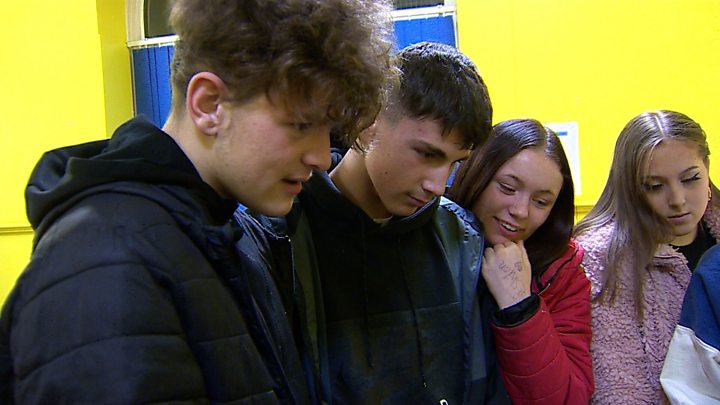Teenagers could be left vulnerable to drugs and crime if more youth clubs close in Wales, sector workers fear.
BBC figures show 163 youth clubs have been closed by councils in the last five years.
One voluntary sector club in Caerphilly said it was "begging for cash" to keep teenagers off the streets.
The body which represents councils said youth work was "vital" and authorities had been forced to make tough decisions due to financial challenges.
Children's commissioner Sally Holland said teenagers were "frustrated" at cuts in communities where drug dealing and knife crime were on the rise.
Councils, charities and voluntary sector organisations run youth services in Wales, which includes work to tackle homelessness and running youth clubs.
But in recent years local authorities have made cuts and reorganised services, with 163 council-run clubs closing since 2014.
The figures, revealed under the Freedom of Information Act, also show the number of council-employed youth workers fell dramatically in the period, with the largest cuts felt in Bridgend, Rhondda and Gwynedd.
A number of voluntary sector groups said they were constantly asking for cash, with some on the brink of closure due to funding issues.
What's it like where I live ?
The youth club closures come as councils in Wales have faced making millions in cuts in a bid to balance their budgets.
The north felt the worst of the cuts.
In 2018, Gwynedd council shut all 39 of its youth clubs and replaced it with one county-wide roving service in a bid to save £270,000.
Conwy closed 15, Wrexham 14 and Flintshire 11, while Anglesey has closed 10, some of which the authority says were shut due to lack of use.
Rhondda was the only area to increase the number of youth clubs, after a reorganisation saw all 20 existing clubs shut with 21 opened in different locations.
All but one council slashed the number of youth workers it employed - with areas including Bridgend cutting its front-line workforce to less than half that in 2014.
Number of youth workers in Wales
for council services

Media playback is unsupported on your device
When Senghenydd youth club (SYDIC), in Caerphilly, opened in 1997 the area had issues with anti-social behaviour and vandalism.
Dave Brenton, who runs the not-for-profit club, said giving young people a non-judgemental safe place to socialise had helped.
The club puts on activities and helps some of the children with issues including mental health problems and drug addiction.
While the club gets funding from charities, Mr Brenton said they were "always begging for cash" and the situation was now dire.
"We are not seen as a thing that is vital, but to these guys we are, we are a place where they can be themselves and voice their opinions," he said.
"There aren't many things for kids to do here," says Esme-Jade Davies, 17, who started volunteering at the club after being a member for years.
"This club means a lot to me because it's like a family. It keeps us out of trouble, and keeps us off the streets."
In Dyffryn Ardudwy, in Gwynedd, parents fundraised to reopen and run their youth club in a small village after the council closed all the groups.
The club is now going strong and has joined forces with the local youth football team, also set up by the community, which is struggling to get funding.
Maisy, 12, said the club was great, adding: "We are not getting into trouble, which is what people do if there is nothing to do."
In June the Welsh Government more than doubled cash available for youth work services for 2019-20, to more than £10m.
The cash, given to councils via the youth support grant, has to be used in partnership with the voluntary sector.
But a large chunk of it is for projects to prevent homelessness and mental health issues.
Caroline Ryan, of YMCA Cardiff, said more cash was needed to give young people a safe place to avoid exploitation and crime.
Set up in 2012 the drop-in runs activities and helps young people avoid getting involved in "County Lines" gangs.
"With local authority clubs closing there is more risk of them getting involved in gangs and knife crime, but if they are engaging in youth clubs they are not going to be going out to take part in criminal activities," she said.
Next April councils are set to get a 4.3% increase in funding as part of the Welsh Government budget - the first significant increase in 12 years.
Dr Holland said youth services are vital as a first line of defence against serious problems like knife crime and drugs and needed investment.
"It's really important that we recognise that spending on youth work can save money in the long term by helping to keep young people happy, healthy and safe," she said.
But the Welsh Local Government Association said the financial outlook for councils remained challenging and tough decisions would still need to be made.
"It would be a matter for individual local authorities to decide how services are provided and funded, using local discretion in line with local circumstances and budgets," he said.
2019-12-22 00:15:52Z
https://www.bbc.com/news/uk-wales-politics-50644585
CBMiM2h0dHBzOi8vd3d3LmJiYy5jb20vbmV3cy91ay13YWxlcy1wb2xpdGljcy01MDY0NDU4NdIBN2h0dHBzOi8vd3d3LmJiYy5jb20vbmV3cy9hbXAvdWstd2FsZXMtcG9saXRpY3MtNTA2NDQ1ODU
Bagikan Berita Ini














0 Response to "Youth club closures: Drug and crime fears for vulnerable teens - BBC News"
Post a Comment